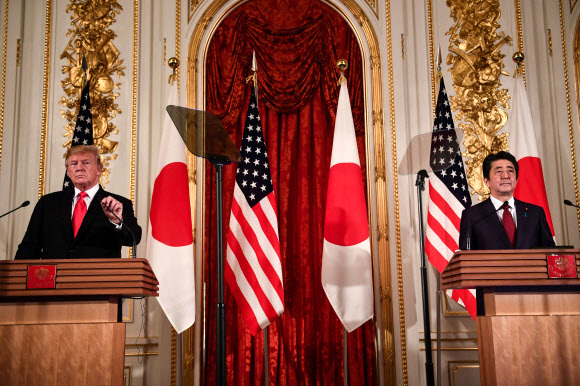 |
|
US Donald Trump (left) and Japanese Minister Shinzo Abe hold a joint press conference at the Moto-Akasaka State Guest House in Tokyo on May 27. (AFP/Yonhap News)
|
US president indicates no change in his stance on NK’s denuclearization
US President Donald Trump stressed his commitment to dialogue with North Korea on May 27, although he did not indicate the change in position Pyongyang is demanding on the issues of sanctions relief and “step-by-step” negotiations. At the same time, he clearly distanced himself from the hardline stance of pressure represented by White House National Security Advisor John Bolton. Speaking in a joint press conference that day at the Moto-Akasaka State Guest House in Tokyo following his summit with Japanese Prime Minister Shinzo Abe, Trump praised North Korean leader Kim Jong-un as a “very smart man,” but reiterated his stance that he is in “no rush at all” to negotiate. His remarks indicated no change in the Trump administration’s insistence on discussing a “denuclearization roadmap” first in the wake of the North Korea-US summit in Hanoi. , But when asked repeatedly about whether he saw North Korea’s missile test launches early this month as being in violation of UN Security Council resolutions, Trump said that while “my people think it could have been a violation,” he “view[s] it differently.” “[T]there have been no nuclear tests. There have been no ballistic missiles going out,” he said, adding that there had been no nuclear testing or long-range missile launches for two years. Trump previously responded to Bolton’s remarks on May 24 calling the North Korean launches a violation of UNSC resolutions by posting a May 25 Twitter message saying, “North Korea fired off some small weapons, which disturbed some of my people, and others, but not me.” His latest remarks on May 27 reaffirmed that he does share Bolton’s perceptions of the North. Abe also showed his differences with Trump during the joint press conference, where he described the North Korean short-range missile launches as “violating the Security Council resolution.” In response to questions from a Korean Central News Agency (KCNA) reporter the same day, a North Korean Foreign Ministry spokesperson denounced Bolton as a “war monger,” adding that “it’s best that this defective human product goes away as soon as possible.” Hong Min, director of the North Korea research office at the Korea Institute for National Unification, observed, “While President Trump did not present that kind of change in stance North Korea wants today, he did distanced himself from Bolton’s hardline position on the North.” “North Korea may have picked up on the signal that recent hardline measures like the US’ recent seizure of a North Korean cargo vessel do not reflect President Trump’s intentions,” he said. Hong added that there was a “growing sense of concern among US politicians and experts recently that the Bolton model of high-handed pressure on the North isn’t suited to pushing North Korea in the direction of denuclearization and only exacerbates the situation.” “We can sense a bit of change with the growing skepticism, where people don’t see successful denuclearization talks as something that can be achieved through sanctions alone,” he said. The same day, Trump visited family members of Japanese nationals abducted by North Koreans and expressed support for Abe’s proposal to hold a summit with Kim to resolve the abductee issue. After finding itself shut out of the Korean Peninsula peace process that had been in motion since last year, Japan has recently been pushing for a stronger presence with its declaration of plans to pursue a summit between Abe and Kim. While some observers are suggesting North Korea may consider the “Japan card” as it looks to find a way out of the impasse in its talks with the US, no significant communication has been reported between Pyongyang and Tokyo. Renews pressure on Japan to reduce trade deficit with US Trump also renewed pressure on Japan to reduce the current trade deficit. In remarks before the summit that day, Trump said, “Trade-wise, I think we will be announcing some things, probably in August.” “We have to do a little catching up with Japan because they’ve been doing much more business with us,” he continued. “We’ll get the balance of trade, I think, straightened out rapidly,” he added. His message read as signaling that while the US plans to wait until the House of Councillors election takes place in Japan in July, it intends to apply full-scale pressure with its trade negotiations afterwards. In response to Washington’s demands, Japan has been negotiating the signing of a bilateral Trade Agreement on Goods (TAG) since last September. As with his first visit to Japan in November 2017, Trump did forget to call openly on Japan to purchase US weapons. In his remarks before the summit, he said, “We make the best [military equipment in the world [. . .] and I feel that they [Japan] need it also.” In the joint press conference afterwards, he said Japan had “just announced its intent to purchase 105 brand new F-35 stealth aircraft,” which “would give Japan the largest F-35 fleet of any US ally.” By Park Min-hee, staff reporter, and Cho Ki-weon, Tokyo correspondent Please direct comments or questions to [english@hani.co.kr]






